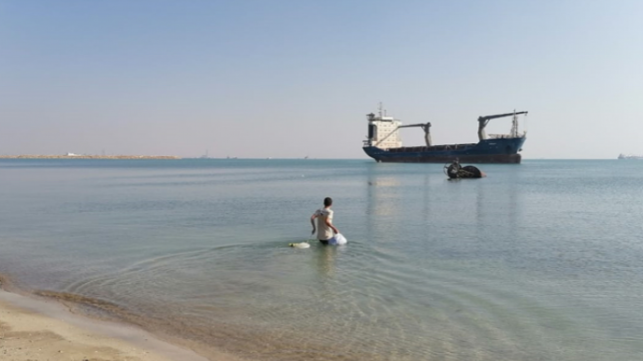Mohammed Aisha, a Syrian sailor working on a Bahraini cargo ship stranded off the Egyptian coast, was forced to spend four years as a castaway after a court made him the ship’s legal guardian.
The sailor’s troubles began in July 2017, when the ship he was working on, the MV Aman, was detained at the Egyptian port of Adabiya, because its safety equipment and classification certificates had expired. Usually, this sort of issues are easily resolvable, but the ship’s owners in Bahrain were experiencing financial difficulties, and its Lebanese contractors. As the ship’s Egyptian captain had gone ashore after the MV Aman was technically abandoned at sea, Mohammed, the ship’s chief officer, was named its legal guardian by a local court. When Aisha signed the document, he had no idea he would be sentencing himself to four years of self-isolation on the ship…

Photo: video screengrab
Mohammed recently told the BBC that he had no idea what being the legal guardian of the MV Aman meant, and only found out four months later, as the other crew members gradually left the vessel. He was legally required to stay with the cargo ship, and by the summer of 2019, he was all alone on it, with no power, no sanitation, and no information on when his ordeal would end.
He watched as ships sailed past, in and out of the nearby Suez Canal, waiting for the day that he would be allowed to go home again. In August of 2018, he got word that his mom had died, and that only made things worse. That was the low-point of his ordeal, as he admits to contemplating the thought of taking his own life.
In March of 2020, the ship that had become Mohammed’s prison was blown off its anchorage by a powerful storm, causing to drift for several miles, before running aground just a few hundred meters from the Egyptian shoreline. The stranded sailor considers this divine intervention, as this allowed him to swim to shore to get food, and charge his cell phone.
A few days ago, after spending almost four years stranded at sea, Mohammed Aisha finally boarded a plane to his home in Syria to see his family and friends again. He described the feeling of leaving the ship as being freed from prison.

Photo: Thomas_G/Pixabay
Contacted by the BBC, Aisha’s employers, Tylos Shipping and Marine Services, said that they had tried to help the sailor over the years, but their hands were tied, and even blamed him for signing the court order that made him legal guardian, which he shouldn’t have done.
“I can’t force a judge to remove the legal guardianship,” a company representative said. “And I can’t find a single person on this planet – and I’ve tried – to replace him.”
On the other hand, the International Transport Workers Federation, which took up Mohammed’s case in December of 2020, claims that his ordeal could have been avoided had the owners of the ship and its contractors had respected their responsibilities and obligations.






